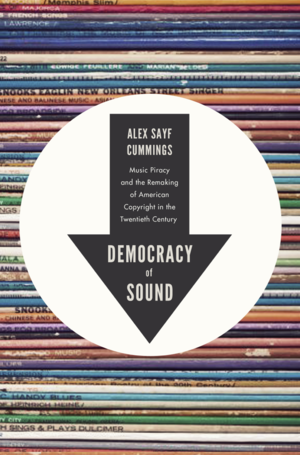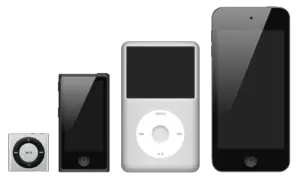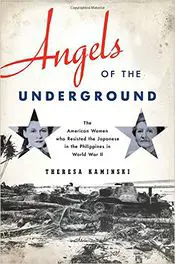Interview:The History of Music Piracy: Interview with Alex Sayf Cummings
When most of us think about music piracy we focus on Napster and Bit Torrent, but music piracy is nothing new. Alex Sayf Cummings explores the history of music piracy during the 20th Century in his book Democracy of Sound: Music Piracy and the Remaking of American Copyright in the Twentieth Century (Oxford, 2013). The Oxford University Press has just released Democracy of Sound in a new paperback edition. Alex is an associate professor of History at Georgia State University. His work has appeared in the Journal of American History, Southern Cultures, and Salon, among other publications, and he is the co-editor of the blog Tropics of Meta. He is also the author of Top Ten Media History Booklist.
In our interview we discuss not only his research on music piracy, but his views on whether traditional books face the same fate as vinyl and CDs.
What was the genesis of your book? When did you realize during that the story of music piracy was going to make a compelling book?
It’s a bit of a funny story—at least to the extent that a story about a dissertation can be funny. I had gone to grad school with the intention of doing urban history, writing about the landscape, built environment, etc. My goal was to work with Elizabeth Blackmar, who has done a lot of incredible work about space, housing, property rights and so forth. However, in my second year I took a course in the School of Art at Columbia called “Open Source Culture,” and it got me thinking about the issues of copyright and technology that had been causing so much controversy at the time, particularly in terms of file-sharing. So I sort of made a switch from focusing on property in the physical sense of land and buildings to intellectual property.
The question that I found so urgent at the time was: if we are, as is so often said, in an information economy or a knowledge economy, then what happens to that form of capitalism when anyone can copy anything, at any time? This is going to become even more of an issue as 3D printing rapidly evolves—we’ll be copying not just music and books, but sofas and hedge-trimmers before long.
The ingenuity of music pirates and bootleggers is astounding. You describe how people in the Communist world used x-ray plates to make records. What do you think drives people to copy and share music? Did music companies make a mistake in trying to suppress this urge through legal action throughout the second half of the 20th century?
That is a tough question. It’s not surprising that record labels, music publishers and the like wanted to suppress copying. No business wants to cede part of its market—or at least part of consumer demand—to anyone else, and most institutions tend to prefer the status quo. I think copyright interests often had a short-sighted view of how music could work as a business. Some artists and labels saw radio as a mortal threat in the 1930s and didn’t want their records played on the air, which seems funny in retrospect since 20 years later the labels would be plying DJs with bribes and blow to get their records on the air. Radio airplay turned out to be a great thing for selling records.
An analogous situation came up in the 1960s with the introduction of magnetic tape. Suddenly there were bootleggers putting together mixes of popular songs—instead of buying an album to get one song you like, you got all the hits on one tape. The labels naturally saw this as a huge threat, since their whole model was based on hyping one song (the single) to sell the LP. The bootleggers wanted there to be a compulsory license for recordings, much like the one we’ve had for written compositions since 1909. (The licensing system Congress set up for written music allowed artists to record songs by paying an automatic, flat royalty to songwriters, rather than individually negotiating the price and permission each time they wanted to record a song.) The bootleggers said that they would be happy to pay labels a flat royalty to reproduce recordings and create new mixtapes with various combinations of songs. That way, labels would get a new revenue stream and consumers would get a product they really liked.
This obviously never happened, and Congress opted instead to crack down on bootlegging in the early 1970s. It’s hard to say how such a system might have worked out for the labels, i.e. if they would have made more money or less. But it’s essentially what we ended up getting with iTunes, where you can buy individual songs a la carte or purchase the entire album if you prefer. It’s definitely a better system for consumers, but the industry was very reluctant to embrace online music at first.
Why didn’t music companies take advantage of the demand for bootleg copies of live recordings? There was a lively market for these recordings and Pearl Jam even released 27 official bootlegs of concerts they recorded in 1993, 2000 and 2003. Why didn’t record companies forcefully move into the official bootleg concert recording business?
It’s really a question of their structure. Major labels are essentially what scholars call “Fordist” enterprises—they’re geared toward selling a lot of copies of a few products. Fans and bootleggers for years had said, “Why don’t you keep these obscure records in print?” and “Why don’t you put out live recordings of all these opera, jazz, rock performances?” The labels basically said it’s not worth it to them to put out a record of Wagner’s Ring cycle or every Charles Mingus show. The resources of their sales staff and production facilities were better employed to sell a million copies of one Frampton Comes Alive than a few copies each of a thousand different Grateful Dead shows. As I show in the book, there were small bootleg labels that were willing to take advantage of economies of scope and make these live records and rarities available, but the majors generally were not interested in dealing with them.
Your book suggests that copyright law is a mess (see Capitol v. Naxos and others). Courts appear to consistently struggle to interpret copyright law. When describing the White-Smith v. Apollo (1908) you describe a court that was perplexed by the new technologies that reproduce sound. Even members of the current United States Supreme admit to being puzzled by new computer technology. Do you think it is the new technology or the push/pull between property rights and fair use that results in these conflicting and confused decisions?
I’d put it down to competing political visions more than confusion about technology. Piano rolls and radio were new and unfamiliar technologies at one point, just like Napster or Aereo were later on—but the Supreme Court came down in a very different way in the latter cases than they did earlier on, in part because the courts in the late twentieth and early twenty-first centuries were more solicitous of property rights and established business interests than the courts of the Progressive or New Deal eras.
Record companies are now shadows of their former selves. Which played a bigger role in their demise: piracy, high CD prices, bad PR (suing their customers) or iTunes?
Like any historian, I’m professionally obligated to say, “It’s a combination of a variety of factors, and it was all very complicated.” But honestly, the industry did get lazy, and it was stubborn in resisting new models instead of trying to take advantage of the new possibilities offered by online distribution. This is an industry that never had a good reputation—in America, the perception of the sleazy label ripping off artists is basically encoded into our cultural DNA—and legally harassing twelve-year-olds certainly didn’t help with this image problem. Hey don't look at us. We didn't the wreck the record business.
It’s more than the labels’ folly, though. The role of the label itself is being fundamentally reimagined. Its very purpose as an institution is in question when an artist like Pomplamoose can attain Internet celebrity through homemade YouTube videos and artists can sell their music directly to fans. Labels were essentially gatekeepers, much like commercial radio or music magazines. They checked and channeled the flow of aspiring musicians that reached audiences. A&R reps scouted talent, and labels provided access to recording infrastructure, pressing plants, distribution networks, and promotion. It goes without saying that artists no longer have to go through a label to be able to record, produce, and distribute their music, although labels still have access to networks of influence and distribution that remain valuable.
But the days of the label as the make-or-break arbiter of music are behind us. You can see this in the rise of companies that provide many of the same services of marketing and distribution to musicians that labels used to do, but artists pay the costs up front, instead of being locked into a contract that forces the artist to recoup the labels’ costs before they end up making money off their music.
While your book focuses on music piracy, it ends with the digitization of music. Books are now being digitized. While traditional books still outsell e-books it is easy to imagine a day when that is reversed. Amazon has pushed publishers to aggressively price e-books - the Hachette/Amazon dispute centers on Amazon’s demand to price Hachette’s e-books at $9.99. Piracy does not appear to be as big a problem for book publishers, but does that mean that their fate will differ from the record companies?
Books have always been a bit different from music in terms of piracy. The reason is not too hard to figure out: bootlegging pages of sheet music on the streets of London or New York in 1890 was a heck of a lot easier and cheaper than copying an entire book, and this has remained the case in many ways. PDFs can circulate as easily as MP3s, but for some reason this problem has not become as serious for publishing as for music.
I suspect it has to do with the fundamental nature of books versus music. As I try to show in the book, music has always had this intensely social nature to it: people go to a concert together, they hear a band and they can’t wait to share it with their friends. This happens with books too, but reading remains this kind of individual experience. Plus, despite the success of e-books, the Kindle, Nook, and so forth, I’d say that there’s still a good deal of inertia in the culture of reading. I’m not an audiophile and it hardly matters to me whether I’m listening to an MP3 or LP, but I do prefer a physical book to an electronic one. I like to come by my back pain honestly. Then again, I know PDF and audiobook versions of my book have circulated widely online, so who knows?
Finally, how would recommend using your book in a class? What themes, ideas or historical trends will your book help students understand?
I think it could be used in a lot of ways. My friends have assigned the book in their classes on historiography in general and the twentieth century United States, thanks primarily to a generous kickback program. [Laughs] It speaks to issues of technology, law, cultural democracy, and media studies. But above all, I think it tells us something about the arc of American political culture in the twentieth century. The book does not explicitly delve into debates about liberalism and conservatism, but there is a distinct trajectory from an anti-monopoly tradition that was strong during the Progressive Era and the New Deal, to a philosophy that leaned heavily on the side of business and property rights in the late twentieth century—something you might call “neoliberalism.”
The idea that what was good for Disney is good for America really took hold in the 1970s. This is the notion that public policy should support anything that promoted jobs and economic growth—as defined, of course, by established industries. Meanwhile, an older conception of the public interest that transcended particular business interests vanished from view. I think that is part of the tragedy of our politics today, although the book shows that there has always been this assiduous resistance to the paradigm championed by copyright interests.
It seems to me that we might be recovering this idea of the public good when you look at recent activism against the Stop Online Piracy Act (SOPA), as well as the Supreme Court’s very good decision in the Myriad Genetics case. I’m not much of an optimist, but I think the book at least shows there’s a back-and-forth, a push-and-pull. That’s the idea behind the title—there was a “democracy of sound” in the sense that democracy involves a lot of friction, a lot of sharp elbows and contention. The fact that there has been a fight at all is a source of hope.
Angels of the Underground: Interview with Theresa Kaminski
The Oxford University Press recently published Theresa Kaminski's Angels of the Underground: The American Women who Resisted the Japanese in the Philippines in World War II. Kaminski's book follows the lives of four American women who were stranded in the Philippines after Japan invaded during World War II. Publishers Weekly described her book as a "fast-paced true story" that documents how these women resisted Japanese occupation. Read more...




